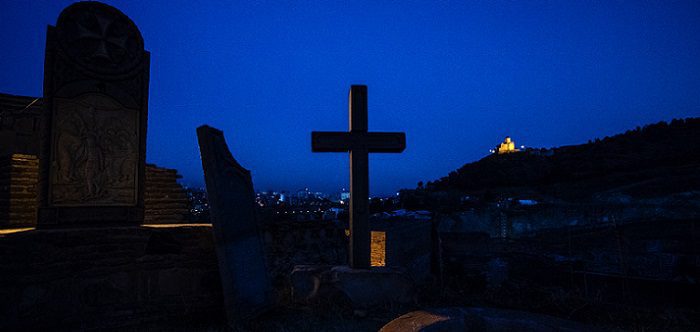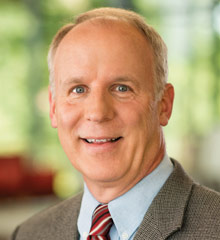Immigration is top-of-mind these days in the U.S. and around the globe. What effect is immigration having on our faith lives? And in what ways are immigration issues front and center in the Bible?
Mark Granquist,
Editor, Word & World
Walls, Exiles, and Migration
By Mark Granquist
We are restless creatures. Scientists can trace the continual wanderings and migrations of human ancestors back millions of years, to when the first hominids wandered out of their African home to populate all corners of the globe, no matter how remote.
Sometimes they were looking for something new and better, sometimes they were simply trying to escape one situation or another. Perhaps at times they wandered just to wander—who knows? In this respect, not much has changed over the eons; we humans are still constantly on the move.
Those who study human migrations (large and small) usually point to two sets of factors in these movements: “pull” factors and “push” factors.
Pull factors are those that entice people to leave their homes and set out for some unknown region that is reputed to be better, the grass always being greener on the other side of the hill.
Push factors are generally negative experiences—drought, war, famine, disease, and other factors that propel individuals to flee an intolerable situation, with the thought that somewhere, anywhere, has to be better than where they are right now. Often, both factors are in play at the same time.
These migrations and wanderings, however, also often create conflict. One group of people move in on another, causing competition and hard feelings over scarce resources and territory. Walls are built to defend, to keep safe, to protect. Walls are also built to keep people out and to exclude. Often, it all depends which side of the wall you are on.
The Bible is full of language about migrations and walls, some very literal, while others express metaphorical truths.
Some of the oldest creedal statements we have in the Old Testament involve the wandering of the Israelite ancestors: “My father was a wandering Aramean, and he went down into Egypt with a few people and lived there and became a great nation, powerful and numerous” (Deuteronomy 26:5). Abraham heard the call of God to leave his home and country and wander to a new land that God was to give to him and his descendants.
Walls are both negative and positive things:
- The walls of Jericho are destroyed to great rejoicing, but the walls of Jerusalem are celebrated as a holy thing and a gift from God.
- The exiles are allowed to rebuild the walls of Jerusalem upon their return, but the prophets remind the people that they need to trust in God and not their walls for their ultimate safety.
- The Jewish people are dispersed from their homeland, and the early Christians following them, in part so that the good news of God in Christ Jesus may be proclaimed to all the nations.
- Following the psalmist, Lutherans are fond of singing, “A mighty fortress is our God, a bulwark [wall] never failing.”
The number of such illustrations is quite striking.
In a world of walls, exiles, and migrations, how are Christians to think about these things? What should a Christian do when conflicts arise among restive human populations, and peoples collide with one another?
These are tough issues, and not ones that are easily solved by slogans on one side or the other. But there are some ways to respond.
- Christians can work, for example, to reduce the pressures and situations where people are pushed or pulled to leave their homes because they cannot find a good life there anymore.
- Christians can work to restore peace and security in places where there are neither.
- Christians can work to assist those who are not able to return to their homes or to help those who wish to return. And they can work to help the world recognize the human worth and potential of all people.
Walls, exiles, and migrations will probably never cease. Some walls are useful and protective and needed to keep people safe (think of the boundary workshops!). Short of the new creation in Christ, the ordering of human society will probably always need them.
But the use of walls and exiles to dehumanize, a constant and sinful temptation, is something that Christians must always resist. Our job is to see the Christ in the neighbor, far and near.
Our God broke down the walls of our sinful rebellion, and has called us, God’s wandering people, for return and restoration. This is our message of hope.
About the Author
Mark Granquist teaches at Luther Seminary, St. Paul, Minnesota,
specializing in American religion and the history of Christianity. He
completed his Ph.D. at the University of Chicago Divinity School.
Previously, Granquist taught in the Religion Departments of St. Olaf
College and Gustavus Adolphus College. An ordained Lutheran pastor
(ELCA), Mark has served a number of different congregations in
Minnesota.
Image credit: Photo by mostafa meraji on Unsplash
Faith+Lead Practices
How can your congregation break down walls that dehumanize? Here are three practices to try:
- Seek out ways to welcome new migrants in your neighborhood by working with community groups that serve immigrant and refugee populations. Volunteer with them. Choose immigrant-led groups wherever possible.
- Host a workshop on developing cross-cultural competence in your congregation with a trained facilitator, or find a workshop you can attend with a group of lay leaders.
- Reach out across denominational and cultural divides to a church in your community that primarily serves a migrant or refugee population. Build a relationship. Bring the congregations together to share a meal or a service project.
Further Resources
Go deeper with these articles from Word & World, Spring 2019:
- “The Impact of Immigration on American Christianity,” by Mark Granquist.
- “New Resources on Religion and Immigrants to Contemporary America,” by Jennifer Hornyak Wojciechowski.
- “Ministering to Immigrant and Refugee Families: A Case Study on Liberian Refugees in Minnesota,” by Rufus Kudee.
- “A Contemporary Theology of Sanctuary as it Relates to Undocumented and Displaced People,” by Timothy Senapatiratne and Brien Aadland.



